Atlanta-Based App Helps Women Of Color Find Hairstylists

Courtesy of Colour co-founder, Debra Shigley
Broadcast version of this story.
Over the last few years more women of color have started wearing their hair in its natural state.
And it’s had an impact on the hair care industry – including on the sale of relaxers, which consumer researching group Mintel says have dropped nearly 20 percent since 2013.
The hair care industry for women of color is big business but, in recent years, more women have gone “natural” – a phrase that describes women wearing their hair in it’s natural state without using a chemical process to change the texture.
Alexis Felder, a hair blogger and YouTube vlogger, says she’s seen natural hair’s popularity grow through meetups.
“I did my very first natural hair meetup in 2009 and the first one had maybe 40 people. I just did a video telling people to come meet me at a pizza bar,” says Felder. “The next one is was like 150 people, then the next one was 300, then the next one was 500. It was growing so much and it was pretty cohesive.”
With more women going natural there’s also greater demand for skilled stylists to achieve looks like twist outs, bantu knots and blow outs.
On a sunny afternoon, stylist Britne Ingram arrives at a two-story loft in Edgewood to meet her client Myka Barbato at her home. She’s been called here through the app Colour.
Amid the normal happenings in a home – Barbato’s young son playing with toys and her dog milling around the living room – the two discuss how to style Barbato’s hair.
They ultimately decide on styling Barbato’s curly, shoulder length hair into a blowout with loose curls.
Barbato chooses her look by swiping through photos on the app. It features styles with names like ‘The Sleek,’ ‘The Chic’ and ‘The Luxe.’
As a mom and business owner, Barbato says the service Colour provides meets her needs.
“Doing something like this is great because I have somebody who comes to my house, which is awesome because I don’t have a lot of time and you can experiment with different hairstyles as well,” she says.
Debra Shigley, Colour Beauty Inc.’s co-founder, says women of color can have a hard time finding a stylist because training in the hair care industry has focused mainly on women with straight hair textures.
“By 2030 more people in this country are going to identify as being multicultural and identify as being part of a minority group and yet the industry has been positioned to one certain kind of customer that does not reflect the vast majority of women in this country,” Shigley says. “We kind of want to blend these two worlds and, at the end of the day, do some amazing hair.”
Shigley is offering her app by invite-only and charges $65 for one visit. There’s also unlimited appointments for $200.
But some women with natural hair might not want to pay that price, blogger Alexis Felder says.
“In Atlanta I feel we’re ahead of the curve a little bit,” she says. ” A lot of people know how to style their own hair these days because of YouTube and because the blogs … When I talk to my friends they don’t really go to the salons … I think it’s a do-it-yourself type of thing nowadays.”
But DIY types aren’t the target customer for the Colour app. The company is looking for busy, professional women who want the convenience of in-home styling. That’s what attracted stylist Britne Ingram.
“As a hair stylist I think I want to say this,” Ingram says, taking a deep breath before she continues. ” In going to cosmetology school and just in being in the hair industry, when I came out I didn’t want to work with people of [my] color. Stereotypically, we’re sitting there for three or four hours a day and I get anxiety. I don’t want to stand anywhere and have people getting mad at me because I’m doing their hair that way.”
But she says working with the Colour app is different.
“With Colour what I really enjoy is being around beautiful, supportive business women, you know, that are appreciative of what you’re doing for them,” she says.
Shigley says she wanted to launch her business here in Atlanta because of the city’s diverse population and she’s competing with several other on-demand hair businesses – all trying to tap into the growing demand of women with natural hair – but hopes her focus on multicultural hair will give her the edge she needs.
9(MDAxODM0MDY4MDEyMTY4NDA3MzI3YjkzMw004))








